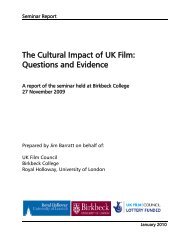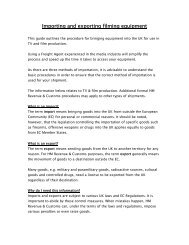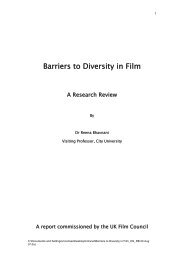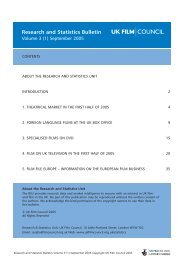The Economic Impact of the UK Film Industry - BFI - British Film ...
The Economic Impact of the UK Film Industry - BFI - British Film ...
The Economic Impact of the UK Film Industry - BFI - British Film ...
Create successful ePaper yourself
Turn your PDF publications into a flip-book with our unique Google optimized e-Paper software.
<strong>Economic</strong> Contribution <strong>of</strong> <strong>the</strong> <strong>UK</strong> <strong>Film</strong> <strong>Industry</strong><br />
July 2007<br />
People who earn higher wages are more likely to have higher levels <strong>of</strong> skills and more easily transferable<br />
skills, and <strong>the</strong>refore companies have a greater incentive to recruit <strong>the</strong>m in an international market.<br />
Ano<strong>the</strong>r factor could be internationally recognised qualifications such as undergraduate and postgraduate<br />
degrees. <strong>The</strong> chart below plots <strong>the</strong> relationship between average wages and university qualifications in<br />
<strong>the</strong> film industry. It shows that <strong>the</strong> post-production segment is ranked highly across <strong>the</strong>se indicators and<br />
<strong>the</strong>refore may well have <strong>the</strong> most internationally mobile workforce.<br />
45<br />
40<br />
35<br />
30<br />
25<br />
Chart 5-5<br />
Labour market mobility factors -<br />
wages and qualifications<br />
£'000s Average<br />
Post-production/<br />
editing/ VFX<br />
Camera<br />
operators<br />
Production/<br />
Script &<br />
development<br />
Size <strong>of</strong> production sub-sector<br />
20<br />
0 10 20<br />
Source: Skillset<br />
30 40 50 60 70<br />
% with a university degree<br />
80 90 100<br />
Ano<strong>the</strong>r factor which affects mobility is nationality. <strong>The</strong> core <strong>UK</strong> film industry attracts many highly skilled<br />
foreign workers to <strong>the</strong> <strong>UK</strong>. <strong>The</strong> Skillset survey suggests that around a tenth <strong>of</strong> <strong>UK</strong>-based production staff<br />
are non-<strong>British</strong>.<br />
Overall, taking into account all <strong>of</strong> <strong>the</strong>se factors, our discussions with <strong>UK</strong> production companies suggest<br />
that up to one-quarter <strong>of</strong> staff would eventually relocate if <strong>the</strong> tax and o<strong>the</strong>r considerations meant that <strong>the</strong><br />
<strong>UK</strong> was no longer attractive to investors in film. In value added terms, <strong>the</strong> proportion could be even<br />
higher as this one-quarter <strong>of</strong>ten represents higher-skilled and higher-waged individuals.<br />
While <strong>the</strong> core <strong>UK</strong> film industry employs many highly skilled workers, <strong>the</strong>re is widespread<br />
acknowledgement within <strong>the</strong> <strong>UK</strong> <strong>Film</strong> Council and <strong>the</strong> film industry itself that <strong>the</strong>se skills need to be<br />
continually updated and developed to stay on <strong>the</strong> knowledge frontier. Indeed, boosting and updating skills<br />
in <strong>the</strong> core <strong>UK</strong> film industry is a key priority within <strong>the</strong> <strong>UK</strong> <strong>Film</strong> Council (see Box 5-1).<br />
30

















